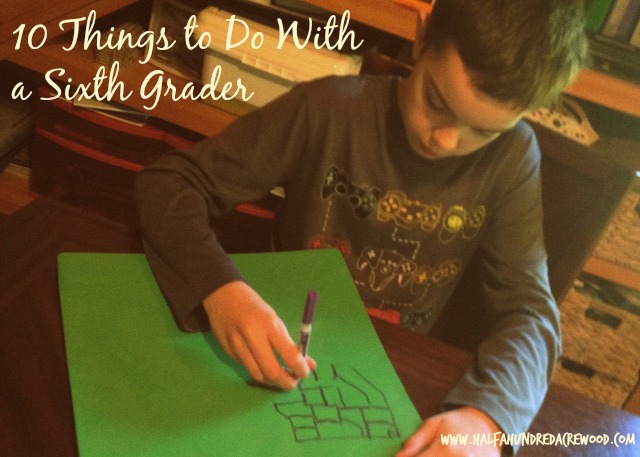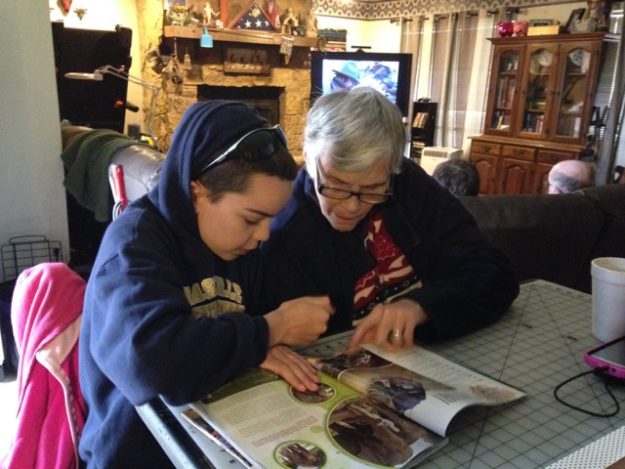
Imagine for a moment…
Your eleven-year-old child has been in the Classical Conversations Foundations Program for four years. He has successfully mastered three cycles of memory work, achieving the Memory Master award for Cycle 1, Cycle 2, and Cycle 3 (followed by a another round of triple-cycle “Mega” Master proofing). Now, he is entering his fifth year of Foundations and still has to wait one more year before he can enter the Challenge program.
What next? How do we better prepare him for Challenge? What shall we do with this sixth grader?
Here’s where we found ourselves this time last year. So… what did we do?
We decided to take a much-needed break and did not worry about “preparing” him more for Challenge.
By taking a break, I don’t mean we dropped everything. We continued with the disciplines of math and language arts. He read great literature and practiced mapmaking. He even did the memory master thing again at the end of the school year. We just didn’t concern ourselves with pushing through something just for the sake of preparation for Challenge. Simply stated, we enjoyed learning together from a state of rest.
Our reasoning: There will be plenty of time for serious coursework during Challenge. If the memory work really has laid a foundation for our children, why not let them pursue something they love while they have more time and flexibility for doing so? Why not spend time with them as they wrestle through the first of the big life-questions they are asking? Why not get to know and enjoy them more in this delicate stage of life?
This year, Stephen accomplished some things he had not previously tackled because, in earlier years, we allowed ourselves to remain in such bondage to memory master efforts. In fact, this focus often robbed us of time, joy, and opportunities. So… this year, we provided wiggle room in his schedule to make decisions about his own education. We helped him find activities that interested him. As we allowed him to become a sort of Nathaniel Bowditch this year, he ended up doing way more than we would have asked him to do!

Stephen teaches Granny all about monster trucks.
In light of that, I want to offer a few ideas here because I was specifically asked this question last week. As we offer this list of ideas, please realize that our 11-year-old did not do all of this stuff. I just like making lists. (I think y’all might know that already…)
Ten Things to Consider for Sixth Grade
- Let them pursue their interests to learn or hone a new skill. What are their interests? Photography? Art? Drama? Keyboarding? (By the way, keyboarding’s a very useful skill to master before heading into middle school…)
- Focus on the skills with which they struggle most. We emphasized IEW writing assignments this year because writing is the most difficult subject for him. We even allowed him to break some rules on a few of his writing assignments so he could express himself through puns and other silly humor. I treasure his writing from this year because it truly is his. (And if you only knew where we had started, you would realize how significant this is and how wonderful IEW has been for us.)
- Allow them to take ownership of leading a part of the school day. (Reading, review games, math games)
- Add more math – through games, puzzle books, or a living math study. Math is NOT Stephen’s favorite subject. BUT… after completing his Saxon math book, he willingly completed two Life of Fred books as a review (Fractions and Decimals & Percents) and has been working in two others (Financial Choices and Pre-Algebra 0 with Physics) just for fun.
- Add some extra Latin vocabulary, and/or practice using the Latin noun declensions and verb endings charts. Visual Latin is a great way to learn more Latin (and is actually preferred in our home over Henle.)
- Practice map drawing, and/or practice countries and capitals using a program like Seterra or use Kristin Draeger’s Draw the World books. (These are great for learning to draw the world freehand!)
- Focus on Fine Arts – incorporate more music appreciation and art study. Our boys get way into music appreciation when we search for orchestras playing major motion picture movie themes like “The Imperial March.”
- Help your student learn to use a planner to plan out his school week. If you prefer not to print a planner from our website, just go grab one from Walmart. Teaching them to use a planner will help them to take a bit more ownership in their education – and it teaches them time management, which is also a valuable skill!
- Read the Challenge A and Challenge B literature selections together. We’ve been reading these books over the last several years, and we’re finishing up the last couple this summer. When he reads them again, our family will be able to enjoy talking about them together and his brothers may even be able to contribute to the whiteboard brainstorming discussions.
- Add new memory work. I found that Stephen is at an age where memory work is still enjoyable, as long as it’s not the same old thing. Plus, his mind is super sharp now, and he is capable of memorizing vast amounts of information with little effort. Simply through copywork, he memorized the final lines of Patrick Henry’s “Give Me Liberty or Give Me Death” speech. He also has enjoyed building upon memory work this year with other audio programs like Lyrical Learning and Audio Memory. He also has enjoyed learning poetry and speeches with Linguistic Development through Poetry Memorization. Scripture memorization is simple with, Bible Readeez, Seeds Family Worship, or MegaVerses Ministries (to name just a few of the options out there!).
If you find yourself in our situation (where your child seems ready for Challenge but you still must wait another year), seize it as an opportunity instead of somewhat begrudging the fact that you must wait another year for Challenge. I can’t express how valuable this extra year was for us. It gave our son some extra time to grow in maturity and grace. It gave our family flexibility and freedom for pursuing deep discussions we may not have had if we were on a strict schedule of “preparing for Challenge.” And, probably most importantly (for our entire family), it kept his mom teaching from a state of rest.
